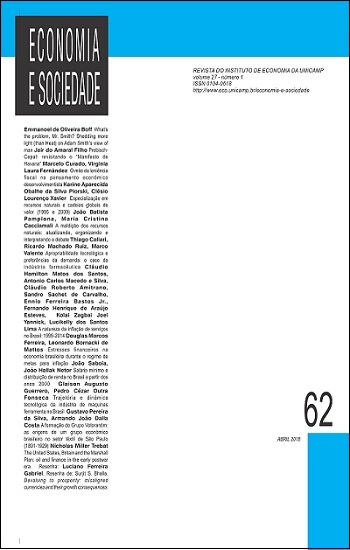Resumo
Este artigo discute a política econômica externa dos EUA no período após a Segunda Guerra Mundial (II Guerra), focando nas relações anglo-americanas e a indústria de petróleo. Ao contrário do que normalmente se pensa, essas relações não foram amigáveis. Um dos principais objetivos dos EUA nesse período foi forçar a Inglaterra a abrir espaço para empresas norte-americanas no Commonwealth britânico e nas regiões petrolíferas do Oriente Médio. O trabalho analisa especificamente a política de petróleo dos EUA durante a implementação do Plano Marshall. Apesar de não questionar o impacto positivo do Plano em termos da recuperação econômica europeia, argumenta-se que, com relação à indústria petrolífera, o objetivo central do Plano foi garantir para produtores norte-americanos uma posição dominante no Oriente Médio.Referências
AMERICAN Petroleum Interests in Foreign Countries 1945, Special Committee Investigating Petroleum Resources, United States Senate, 79th Congress, 1st Session, Jun.
BLOCK, F. Origins of international economic disorder: a study of United States international monetary policy from World War II to the present. 1977.
EFFECTS of oil imports on domestic producers. v. I, II, III, Hearings before the Select Committee on Small Business, United States House of Representatives, 81st Congress, 1st Session, 1949.
GARDNER, R. Sterling-dollar diplomacy. Oxford University Press, 1956.
HASKINS, H. Needed: a strategy for oil. Foreign Affairs, Jan. 1951
HOGAN, M. The Marshall Plan, America, Britain and the reconstruction of Western Europe, 1947-1952. 1987.
KLARE, M. The geopolitics of war. The Nation, 2001.
MENDERSHAUSEN, H. Dollar shortage and oil surplus. Harry S. Truman Library, Record Group 286, Records of Gordon Gray, Special Assistant to the President. 1950.
MULTINATIONAL Oil Corporations and US Foreign Policy, Report to the Committee on Foreign Relations, United States Senate. Jan. 1975.
PAINTER, D. S. Public power and private policy: multinational oil corporations and US Foreign Policy, 1941-1954. Johns Hopkins University Press, 1986.
PAINTER, D. S. Oil and the Marshall Plan. The Business History Review, v. 58, n. 3, p. 359-383, Autumn 1984.
PETROLEUM Study. Hearings before a Subcommittee on Interstate and Foreign Commerce, United States House of Representatives, 81st Congress, 2nd session. 1950.
QUANDT, W. Saudi Arabia in the 1980s: foreign policy, security, and oil. Washington, D.C.: Brookings Institution Press, 1981.
RECORDS of the Agency for International Development. Mutual Security Agency (Economic Cooperation Administration), Herbert Hoover Presidential Library, Oct. 1948.
REPORT on the Third World Petroleum Congress. United States Senate, 82nd Congress, 2nd Session. 1951.
RICHMAN, S. Ancient history: US conduct in the Middle East since World War II and the folly of intervention. Cato Institute Policy Analysis, Aug. 1991.
SCHWARZ, B. Why America thinks it has to run the world. The Atlantic Monthly, Jun. 1996.
THE ECONOMIST. Egypt’s sterling balances. Jan. 1, 1949.
THE ECONOMIST. Selling for dollars. Jan. 1, 1949.
THE ECONOMIST. Marshall Plan for the creditors? Jan. 8, 1949.
THE ECONOMIST. Majors and minors in oil. Mar. 5, 1949.
THE ECONOMIST. Oil supplies – and demand. Oct. 8, 1949.
THE ECONOMIST. Oil trade in dollars and sterling. Dec. 3, 1949.
TUCKER, R. The purposes of American Power. Foreign Affairs, v. 59, n. 241, p. 248-271, 1980-81.
A Economia e Sociedade utiliza a licença do Creative Commons (CC), preservando assim, a integridade dos artigos em ambiente de acesso aberto.

